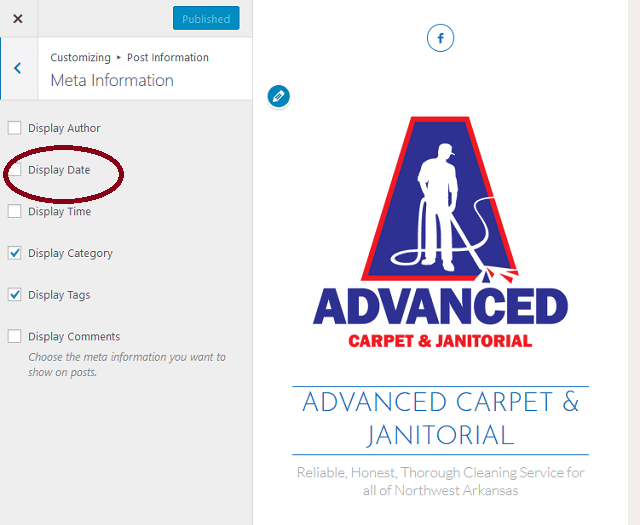Your cart is currently empty!

Dates on Your Blog Posts?
A blog — even if you don’t call it a blog — is one of the best tools for SEO and increasing the overall value of your website. Regular, fresh content at your website gets the attention of the search engines and brings visitors back to your site. It gives you good reasons to link to your website at social media platforms, allows you to work toward more keywords, and increases your authority. When you add a blog to your website, you have a lot of decisions to make. Here’s one you might not have thought about: should you have dates on your blog posts?
The screenshot above is a website that shows the date each article was posted. This happens automatically.
This screenshot shows a blog with no dates. Again, this is automatic. When you publish a blog post, it either shows the date or does not.
How can you make the date show or not show?
If you have a WordPress website, you might be using a theme built with an option to include or exclude the date in the Customizer. It should be under “Meta Information” or a similar heading.

If you have — or are getting — a custom WordPress website, the decision was probably made early in the process. Or, if you’re in the process now, you should make that decision. Your designer will include or exclude the date in the meta data of your posts, as you prefer.
There are also WordPress plugins that allow you to exclude the date, if your theme doesn’t give you that option.
That’s how to include or exclude dates on your blog. Which way should you go?
Good reasons not to have dates on your blog
The main reason that we recommend NOT giving dates on your blog is very simple: if you don’t add content regularly, the dates on your blog posts can make you look lame. Out of date. Possibly out of business.
Don’t let people see that you haven’t written anything new in months (or years). Just leave off the dates and no one will be the wiser.
Another good reason to leave dates out is if your content is mostly evergreen. Evergreen content is information that is useful at any time. For example, your instructions on how to give medicine to a baby will not be out of date in six months, so there’s really no reason to specify a date.
ShoutMeLoud did a small case study and found that adding dates cut their traffic considerably. Other equally small and unscientific studies saw similar results. We have dates on some of the blogs we manage and not on others, so we have access to larger pools of data. We do Analytics reports on all the blogs with regular posting, and we have never seen any indication that dates/no dates makes any significant difference. More on this later.
However, if you worry that people in your target audience simply won’t read posts from the past, that could be a reason to leave dates out.
Good reasons to have dates on your blog
If we do a search on how to do something with software, or on Google’s latest algorithm changes, or on recent changes in birth control options, we may choose to look only at recent information. The screenshot below shows how this can be done at Google.com, in case you haven’t tried it.

If we wanted info on giving kids medicine, we would just want the right answer, but there are plenty of searches for which we want an up to date answer. Much of this information will show up if we specify a news search, but not all of it.
If this is the kind of information that you’re publishing, you should show dates. In these cases, dates matter.
Some of the articles we read in researching this question are by people who almost always use the recency tools, and therefore feel that they should provide dates. If that resonates with you, you have your answer.
Data
There are quite a few anecdotal claims that including dates reduces traffic. We have access to enough information that we should be able to see that if it is generally true.
Anecdotal claims should never be understood as, “Having dates on your blog makes traffic decrease.” They should always be understood as, “Having dates on my blog, in this particular industry and with these particular other variables in play, made my traffic decrease.”
We looked a pairs of blogs that were in the same industry and had the same posting schedules. We don’t have lots of those pairs, but the amount of data we have is certainly larger than what we’ve seen online elsewhere. We can’t share client data with you, obviously, but we can tell you that there is no statistically significant pattern showing that dates either help or hinder traffic within that data pool.
Action steps
Here’s what we recommend:
- Choose whether or not to include dates in your blog posts based on the visitor experience for your particular audience.
- Update posts that perform well but are out of date. Add or substitute up-to-date information and update the date, but don’t change the URL.
- Update or remove posts that are out of date and don’t perform well. Read about unpopular blog posts first, but get rid of the ROT.
by
Tags:
Comments
2 responses to “Dates on Your Blog Posts?”
Great article
Thanks for this amazing informative article. I am going to save this in my bookmarks. Though I am still going through theories in digital marketing and SEO but It will help me in my practice later.



Leave a Reply